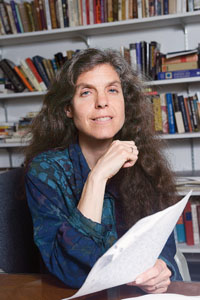Amy Dru Stanley, Associate Professor in History and the College
By William HarmsNews Office
 | |
As a teacher, Amy Dru Stanley strives to help her students develop an independent perspective and encourages them to “read with great subtlety and write with great precision,” she says.
“I like my students to learn how to pursue their research rigorously but also give them freedom and space. I want them to learn to ask original questions,” says Stanley, Associate Professor in History and the College.
“I want them to learn to read the primary source material for evidence that goes beyond the superficial explanations of why events happen. I want them to go below the surface but also look at the implications of events in history,” she says.
Her own experiences as an undergraduate and graduate student guide her teaching.
“I took a class my first year at Princeton with Sheldon Wolin, a political theorist. The class wasn’t so much about a body of knowledge but rather about learning to think theoretically,” Stanley says.
David Brion Davis, a historian at Yale University, who she describes as “extremely rigorous, but also committed to letting students pursue their own interests,” also influenced her.
Stanley’s research and teaching focus on the early Republic through the Progressive Era. She is especially interested in the intersections of intellectual, social and legal history, and gender, labor, slavery and emancipation. Her own work shows that history is full of ambiguities, and often explanations must be unearthed through careful scholarship.
Her book, From Bondage to Contract: Wage Labor, Marriage and the Market in the Age of Slave Emancipation (1998), for example, demonstrates that the act of emancipation brought with it a number of questions and forced people to rethink marriage as well as wage labor.
Those questions included: Were people who were paid for their labor slaves because their labor was for sale? Were wives slaves because, by law, both their persons and labor belonged to their husbands? Must husbands lose their rights as masters when wives sold their labor as a market commodity?
The issues became complicated after the freeing of the slaves in the South, as Northern liberators sometimes punished freed slaves for vagrancy because they refused to enter into contracts and work for wages.
Stanley encourages students to look at other historical events with the same curiosity.
“They need to figure out what problems they want to look at and not just follow my intellectual interests and conclusions,” she says.
During research seminars and in individual sessions with students, she challenges the young scholars to look at questions in a new way, and gives them freedom to look at connections between different forces, which may not seem related in the past, but may in fact have had a great deal of impact on events.
Stanley, who joined the Chicago faculty in 1994, previously taught at the University of California, Irvine. She received an A.B. from Princeton University in 1978 and a Ph.D. from Yale University in 1990.
![[Chronicle]](/images/sidebar_header_oct06.gif)